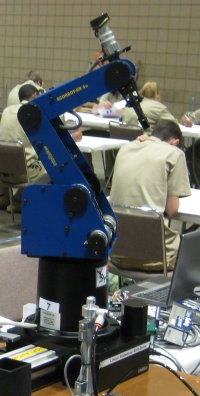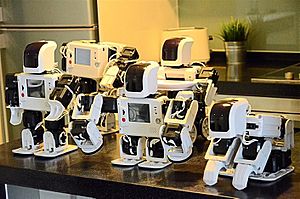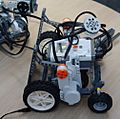Educational robotics facts for kids
Educational robotics is a cool way to learn about designing, building, and using robots. These robots can be anything from big machines with moving arms to small, smart vehicles that move on their own. You can start learning about educational robotics from elementary school all the way through college. It's also a great way to get excited about other important subjects like computer programming, artificial intelligence, and engineering.
Contents
Learning About Robots

People who work with robots are called robotics engineers. They design new robots, keep them working, and find new ways for robots to help us. Robotics has become a popular learning tool in many middle and high schools. It's also a big hit at summer camps for kids. This helps students get interested in programming, artificial intelligence, and robotics itself. Some universities even teach robot programming in their first computer science classes.
Robots in Schools
Back in 1974, a robot teacher named Leachim was invented. Leachim was programmed with school lessons and even facts about its 40 students. It could speak like a human! This robot was tested in a fourth-grade classroom in New York.
More recently, companies like Cytron Technologies have brought their rero robots into schools. These robots are designed to be easy and safe to build and program. This makes learning about robotics fun for young kids, even those who have never coded before. Robotics education is now shared widely through science fairs, workshops, and camps.
College Degrees in Robotics
For a long time, if you wanted to study robotics in college, you would take special classes within other subjects. These subjects included mechanical engineering, electrical engineering, or computer science.
But since about 2005, more universities have started offering specific degrees in "Robotic Engineering." This means you can now get a degree where "robotics" is right on your diploma! These programs teach you everything you need to know to become a robotics expert.
Getting Certified in Robotics
The Robotics Certification Standards Alliance (RCSA) is a group that gives out special certificates in robotics. These certificates show that you have certain skills and knowledge in the field.
Summer Robotics Camps
Many summer camps now include robotics as a main part of their activities. Famous museums, like the American Museum of Natural History, also offer youth robotics programs.
Going to a robotics camp has many benefits. You learn how to work well in a team because most activities need everyone to cooperate. You also learn to be resilient and motivated. When you finish a challenging robot project, you feel proud and accomplished! Plus, you get to make important decisions to solve problems with your robot.
Robotics for Special Education
Educational robotics can be very helpful for children in early and special education. It can help kids develop skills that make them more independent and help them fit into society. Social and personal skills can also grow through robotics.
For example, teachers have used Lego Mindstorms NXT with middle schoolers. This helped the children improve their social and personal skills by working together on programs. Creating artwork and scenery for the robots also helped them use their problem-solving skills and creativity.
Other studies show that educational robotics can improve thinking skills, like executive functions. These are skills like problem-solving, reasoning, and planning. One study used a robot called Bee-Bot with school and preschool children who had Down syndrome. After eight weeks, the children showed more interest, attention, and interaction with others. This study suggests that robotics can also improve visuo-spatial memory (understanding where things are in space) and mental planning.
Images for kids
See also
 In Spanish: Robótica educativa para niños
In Spanish: Robótica educativa para niños
 | John T. Biggers |
 | Thomas Blackshear |
 | Mark Bradford |
 | Beverly Buchanan |



